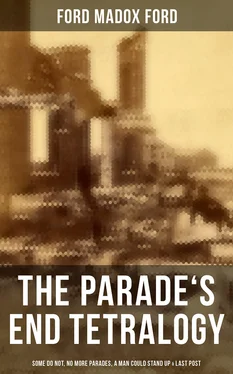But, brightened up as he now suddenly saw her, with silk for the pink cotton, shining coiled hair for the white canvas hat, a charming young neck, good shoes beneath neat ankles, a healthy flush taking the place of yesterday’s pallor of fear for her comrade; an obvious equal in the surroundings of quite good people; small, but well-shaped and healthy; immense blue eyes fixed without embarrassment on his own . . .
‘By Jove . . . ’ he said to himself: ‘It’s true! What a jolly little mistress she’d make!’
He blamed Campion, Sandbach and the club gossips for the form the thought had taken. For the cruel, bitter and stupid pressure of the world has yet about it something selective; if it couples male and female in its inexorable rings of talk, it will be because there is something harmonious in the union. And there exists then the pressure of suggestion!
He took a look at Mrs Duchemin and considered her infinitely commonplace and probably a bore. He disliked her large-shouldered, many-yarded style of blue dress and considered that no woman should wear clouded amber, for which the proper function was the provision of cigarette holders for bounders. He looked back at Miss Wannop, and considered that she would make a good wife for Macmaster; Macmaster liked bouncing girls and this girl was quite lady enough.
He heard Miss Wannop shout against the gale to Mrs Duchemin:
‘Do I sit beside the head of the table and pour out?’ Mrs Duchemin answered:
‘No! I’ve asked Miss Fox to pour out. She’s nearly stone deaf.’ Miss Fox was the penniless sister of a curate deceased. ‘You’re to amuse Mr Tietjens.’
Tietjens noticed that Mrs Duchemin had an agreeable turret voice; it penetrated the noises of Mr Horsley as the missel-thrush’s note a gale. It was rather agreeable. He noticed that Miss Wannop made a little grimace.
Mr Horsley, like a megaphone addressing a crowd, was turning from side to side, addressing his hearers by rotation. At the moment he was bawling at Macmaster; it would be Tietjens’ turn again in a moment to hear a description of the heart attacks of old Mrs Haglen at Nobeys. But Tietjens’ turn did not come . . .
A high-complexioned, round-cheeked, forty-fivish lady, with agreeable eyes, dressed rather well in the black of the not-very-lately widowed, entered the room with precipitation. She patted Mr Horsley on his declamatory right arm and, since he went on talking, she caught him by the hand and shook it. She exclaimed in high, commanding tones:
‘Which is Mr Macmaster, the critic?’ and then, in the dead lull to Tietjens: ‘Are you Mr Macmaster, the critic? No! . . . Then you must be.’
Her turning to Macmaster and the extinction of her interest in himself had been one of the rudest things Tietjens had ever experienced, but it was an affair so strictly businesslike that he took it without any offence. She was remarking to Macmaster:
‘Oh, Mr Macmaster, my new book will be out on Thursday week,’ and she had begun to lead him towards a window at the other end of the room.
Miss Wannop said:
‘What have you done with Genie?’
‘Genie Mrs Wannop exclaimed with the surprise of one coming out of a dream. ‘Oh yes! She’s fast asleep. She’ll sleep till four. I told Hannah to give a look at her now and then.’
Miss Wannop’s hands fell open at her side.
‘Oh, mother !’ forced itself from her.
‘Oh, yes,’ Mrs Wannop said, ‘we’d agreed to tell old Hannah we didn’t want her to-day. So we had!’ She said to Macmaster: ‘Old Hannah is our charwoman,’ wavered a little and then went on brightly: ‘Of course it will be of use to you to hear about my new book. To you journalists a little bit of previous explanation . . . ’ and she dragged off Macmaster, who seemed to bleat faintly . . .
That had come about because just as she had got into the dog-cart to be driven to the rectory—for she herself could not drive a horse—Miss Wannop had told her mother that there would be two men at breakfast, one whose name she didn’t know; the other, a Mr Macmaster, a celebrated critic. Mrs Wannop had called up to her:
‘A critic? Of what?’ her whole sleepy being electrified.
‘I don’t know,’ her daughter had answered. ‘Books, I daresay . . . ’
A second or so after, when the horse, a large black animal that wouldn’t stand, had made twenty yards or so at several bounds, the handy man who drove had said:
Yer mother’s ‘owlin’ after yer.’ But Miss Wannop had answered that it didn’t matter. She was confident that she had arranged for everything. She was to be back to get lunch; her mother was to give an occasional look at Genie Wilson in the garret; Hannah, the daily help, was to be told she could go for the day. It was of the highest importance that Hannah should not know that a completely strange young woman was asleep in the garret at eleven in the morning. If she did the news would be all over the neighbourhood at once, and the police instantly down on them.
But Mrs Wannop was a woman of business. If she heard of a reviewer within driving distance she called on him with eggs as a present. The moment the daily help had arrived, she had set out and walked to the rectory. No consideration of danger from the police would have stopped her; besides, she had forgotten all about the police.
Her arrival worried Mrs Duchemin a good deal, because she wished all her guests, to be seated and the breakfast well begun before the entrance of her husband. And this was not easy. Mrs Wannop, who was uninvited, refused to be separated from Mr Macmaster. Mr Macmaster had told her that he never wrote reviews in the daily papers, only articles for the heavy quarterlies, and it had occurred to Mrs Wannop that an article on her new book in one of the quarterlies was just what was needed. She was, therefore, engaged in telling Mr Macmaster how to write about herself, and twice after Mrs Duchemin had succeeded in shepherding Mr Macmaster nearly to his seat, Mrs Wannop had conducted him back to the embrasure of the window. It was only by sitting herself firmly in her chair next to Macmaster that Mrs Duchemin was able to retain for herself this all-essential, strategic position. And it was only by calling out:
‘Mr Horsley, do take Mrs Wannop to the seat beside you and feed her,’ that Mrs Duchemin got Mrs Wannop out of Mr Duchemin’s own seat at the head of the table, for Mrs Wannop, having perceived this seat to be vacant next to Mr Macmaster, had pulled out the Chippendale armchair and had prepared to sit down in it. This could only have spelt disaster, for it would have meant turning Mrs Duchemin’s husband loose amongst the other guests.
Mr Horsley, however, accomplished his duty of leading away this lady with such firmness that Mrs Wannop conceived of him as a very disagreeable and awkward person. Mr. Horsley’s seat was next to Miss Fox, a grey spinster, who sat, as it were, within the fortification of silver urns and deftly occupied herself with the ivory taps of these machines. This seat, too, Mrs Wannop tried to occupy, imagining that, by moving the silver vases that upheld the tall delphiniums, she would be able to get a diagonal view of Macmaster and so to shout to him. She found, however, that she couldn’t, and so resigned herself to taking the chair that had been reserved for Miss Genie Wilson, who was to have been the eighth guest. Once there she sat in distracted gloom, occasionally saying to her daughter:
Читать дальше












